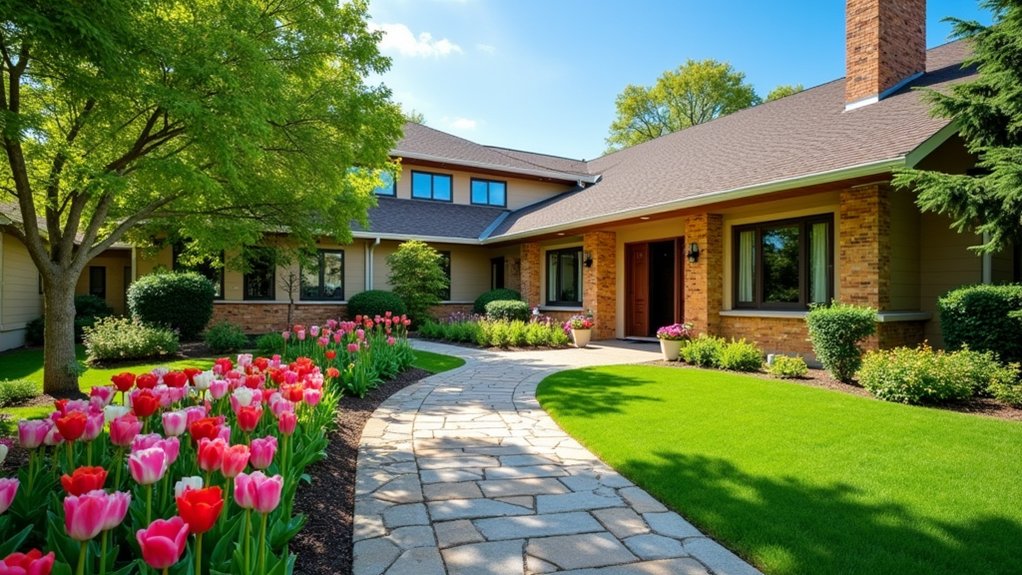Why Choose the Right Residential Care Facility?

Choosing the right residential care facility is essential for your loved one’s safety, comfort, and happiness. You’ll make certain they get the proper support—whether it’s assisted living, nursing care, or memory care—that matches their needs. You can check staff expertise, quality of services, and location for accessibility. Don’t overlook amenities and lifestyle fit to keep them engaged. Stick around to uncover more tips on making the best choice for their well-being.
Key Takeaways
- Choosing the right facility ensures personalized care tailored to specific health and lifestyle needs.
- It promotes safety, comfort, and independence in a supportive environment.
- The right facility offers qualified staff for quality medical and emotional support.
- Proximity to family and resources enhances visitation and emergency access.
- Compatible amenities and activities improve overall well-being and satisfaction.
Understanding Different Types of Residential Care Options

As you begin exploring residential care for yourself or a loved one, it’s essential to understand the various options available. You’re taking a meaningful step to guarantee comfort and support, and knowing what’s out there helps you make the best choice.
Residential care facilities vary widely, each designed to meet different needs with compassion and dedication.
Residential care options are diverse, thoughtfully crafted to address unique needs with heartfelt care and unwavering commitment.
Start with assisted living if you or your loved one needs help with daily tasks like bathing or medication management, while still valuing independence. Assisted living offers a balance between independence and support, allowing residents to maintain personal autonomy while receiving necessary care.
Consider nursing homes for more intensive medical care, ideal for those with chronic conditions.
Memory care units offer specialized support for individuals with dementia, focusing on safety and engagement.
Finally, board and care homes provide a smaller, family-like setting for personalized attention.
As you weigh these options, think about the specific needs and preferences that matter most to those you’re serving.
Assessing Quality of Care and Services Offered
Now that you’ve explored the different types of residential care options, let’s focus on evaluating the quality of care and services provided. As someone committed to serving others, you’ll want to make sure the facility meets the needs of those you care about.
Start by reviewing the range of services offered—do they provide personalized care plans, medical support, and daily assistance? Check if they offer engaging activities to promote emotional and social well-being.
Next, observe the environment during a visit. Is it clean, safe, and welcoming? Talk to residents and families to gauge their satisfaction with the care provided.
Look for transparency in policies and communication—does the facility openly share how they address concerns? Finally, assess if the care aligns with your values of compassion and dignity. Facilities that ensure comprehensive health monitoring can significantly enhance the quality of care provided.
Choosing a facility with high-quality services makes certain those you serve receive the respect and support they deserve.
Evaluating Staff Expertise and Training

How can you be certain the staff at a residential care facility are equipped to meet your loved one’s needs? Start by asking about their qualifications. Check if they’ve got relevant certifications, degrees, or specialized training in areas like dementia care or physical therapy.
Don’t hesitate to inquire how often they receive ongoing education to stay updated on best practices. Your loved one deserves caregivers who are skilled and prepared.
Next, observe how staff interact with residents. Do they show patience, empathy, and genuine care? Talk to them directly—ask about their experience and how they handle challenging situations.
Watch how staff engage with residents. Are they patient and empathetic? Speak with them about their experience and approach to challenges.
A dedicated team will welcome your questions and demonstrate their commitment to serving others. Finally, request details on staff-to-resident ratios to guarantee there’s enough support. Additionally, ensure that the facility offers personalized care plans tailored to meet individual needs, as this is crucial for providing effective support.
Considering Location and Accessibility Factors
Beyond evaluating staff expertise, think about the location and accessibility of a residential care facility. As someone dedicated to serving others, you’ll want a place that’s easy for family and friends to visit, ensuring your loved one feels connected and supported.
Is the facility near your home or in a familiar community? Consider travel time and whether public transportation options are available if driving isn’t always possible.
Also, check the accessibility within and around the facility. Are there ramps, wide doorways, and safe pathways for those with mobility challenges? You’re advocating for someone’s comfort, so confirm the location suits their physical needs and promotes independence. In addition, facilities that offer structured environments and safety considerations can significantly enhance the quality of life for residents.
Look at nearby resources like hospitals or pharmacies—proximity to these can be essential in emergencies. By prioritizing location and accessibility, you’re helping create a nurturing environment where your loved one can thrive with dignity and ease.
Exploring Amenities and Lifestyle Compatibility

What truly makes a residential care facility feel like home for your loved one? It’s the amenities and lifestyle compatibility that align with their needs and personality.
As you explore options, look for facilities offering activities they enjoy—maybe art classes, gardening, or social events. Check if they provide nutritious meals tailored to dietary needs and preferences. You’ll want to guarantee there are comfortable common areas for relaxation and connection with others.
Beyond basics, consider how the environment supports their daily rhythm. Does the facility encourage independence with accessible spaces? Are there wellness programs or spiritual services that resonate with their values? Additionally, understanding the support provided by professional caregivers is crucial for ensuring their overall well-being.
You’re not just choosing a place to stay; you’re helping them thrive. Ask staff about personalized care plans and observe how residents engage. By prioritizing amenities and lifestyle fit, you’ll create a nurturing space where your loved one feels truly at home.
Frequently Asked Questions
What Is the Cost of Residential Care?
Hey, you’re probably wondering about the cost of residential care. Don’t worry, I’ve got you covered!
Costs can vary widely based on location, services, and level of care needed, ranging from $3,000 to $8,000 a month.
You’ll want to research facilities, ask for detailed pricing, and see what’s included.
Remember, you’re investing in someone’s well-being, so prioritize quality care over just the price tag.
Let’s find the best fit together!
Are There Financial Assistance Options Available?
Are there financial assistance options available? Absolutely, and you can explore them to support those you care for.
Look into government programs like Medicaid or veterans’ benefits if you’re eligible.
Don’t hesitate to check with local charities or non-profits that often help with costs.
Reach out to residential care facilities directly; they’ll guide you through grants or payment plans.
You’re not alone—take action to ease the financial burden for others.
How Are Medical Emergencies Handled?
When it comes to handling medical emergencies, you’ll find peace of mind knowing you’re prepared to serve.
You’ll act swiftly, contacting on-site medical staff who’re trained for urgent situations. You’ll guarantee residents get immediate care, whether it’s stabilizing them or arranging hospital transport.
You’ll communicate with families, keeping them informed. Your dedication guarantees everyone’s safety, and you’re always ready to step in, making a real difference in critical moments.
Can Residents Personalize Their Living Spaces?
Hey, you’re probably wondering if residents can personalize their living spaces.
Absolutely, you can help them make their rooms feel like home! Encourage adding personal touches like family photos, favorite blankets, or small decorations.
Assist in arranging furniture to suit their comfort. By supporting their individuality, you’ll create a warm, familiar environment that boosts their happiness and sense of belonging.
Your care truly makes a difference in their lives!
What Are the Visiting Hours for Families?
Hey there, wondering about visiting hours for families?
You’ll be glad to know most facilities offer flexible schedules to guarantee you can spend quality time with your loved ones.
Check the specific care home’s policy, as hours might vary, but many prioritize family connection.
Don’t hesitate to call ahead and confirm—your presence means the world to residents.
Keep nurturing those bonds; it’s a beautiful way to serve!






